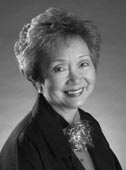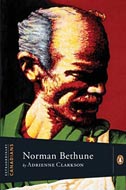Norman Bethune in Clear Focus

Adrienne Clarkson
|
A highlight of this year's meeting
of the Bethune Roundtable
was a presentation by former
Governor General the
Right Honourable Adrienne
Clarkson, launching her new
biography of Norman Bethune.
In his opening remarks,
University of Toronto President
David Naylor thanked Adrienne
Clarkson for bringing Norman
Bethune into clearer focus for
Canadians by telling his story in a dynamic, accessible
way. He called the book a gem that: "I couldn't put down,
but read in two sittings - exceptional for a university
president who usually has the attention span of a 5-yearold."
He praised the book for its compelling, economical
and poetic language, as he welcomed Adrienne Clarkson
as "one who needs no introduction".
Adrienne Clarkson began by acknowledging Lee
Errett, recipient of the Bethune Prize, and Terry Donnelly
for the work they have done in China, performed in the
spirit of Norman Bethune. Historically, Western perceptions
of Bethune have been coloured by his political
affiliation, but it is Clarkson's contention that he was
primarily a practical man whose politics were always
driven by his desire to help people as a doctor.
Bethune's commitment to helping people was evident
early in his life when he interrupted his medical studies
to volunteer in remote logging camps, teaching literacy to
immigrant workers, one-third of whom arrived in Canada
with tuberculosis. During WWI he served as a stretcherbearer
and suffered a shrapnel wound. After the war he
opened a practice in the slums of Detroit, where he contracted
TB himself. Close to death, he convinced a colleague
to perform an artificial pneumothorax, experimental
at that time. It saved his life. Bethune was always uncomfortable
accepting payment from patients; he believed doctors
should be paid by governments, and this aggravated
conflicts with some of his colleagues, though he was uniformly
liked and praised by his students and patients.
|
Clarkson described Bethune as having been "lit up
by the opportunities to intersect with history, first in
Spain and then in China". He went to Spain when
civil war broke out because most Spanish doctors
supported Franco and the fascists, leaving Republican
fighters and supporters underserviced. He developed
a transfusions truck, which he brought from London
to Madrid. Despite less-than-optimal sanitary and
screening conditions, he carried out transfusions
on the battlefield because it was "better to live with
syphilis than to die." This work proved a valuable propaganda
tool for the Republicans who galvanized their
supporters to give blood.

Norman Bethune
|
In the early 20th century China was a primary
focus for Toronto churches which regularly sent missionaries.
As the son of a
clergyman, Bethune heard a
great deal about their experiences
and China came to
inhabit a special place in his
imagination. So when Japan
invaded China in 1937, he
was determined to go. He
was the only physician in
the northwest region of the
country, serving 15 million
people, both soldiers and
civilians, often performing
125 operations a week. He
died in 1939 of septicemia, cut by a bone fragment while
performing surgery on the battlefield.
Bethune was a member of the Communist party for
the last three years of his life - a practical affiliation,
Clarkson believes, that arose out of his strong opposition
to fascism. For this, he has often been dismissed by
Canadian historians, but the Chinese always understood
his basic generosity. Their affectionate nickname for
him translates as "Big Table", meaning he was capable of
welcoming everyone to eat at his table.
The Penguin Extraordinary Canadians series is designed
to be concise and readable. Clarkson described it as a "winning
format, without tiresome footnotes", that proved to
be a great exercise in discipline for herself as a writer.
Julie Roorda
Assistant Editor
|